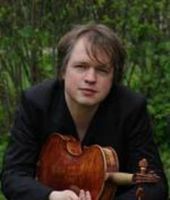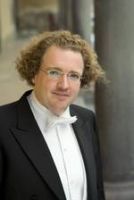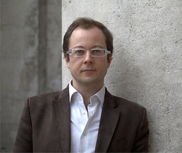Time Travel at the CSO
Mary Ellyn Hutton
Posted: Nov 21, 2009 - 1:41:32 PM in
reviews_2009

Henning kraggerud
|
The Cincinnati Symphony Orchestra, having done some time traveling recently -- over 14 time zones to Japan and back earlier this fall -- opened its first concert back on home turf November 20 at Music Hall with French composer Guillaume Connesson's "Aleph" (2007).
A kind of symphonic poem on The Big Bang, the nine-minute composition is part one of Connesson's "Cosmic Trilogy." The Trilogy itself appears to have been written "backwards." Part three, "Supernova," dates from 1997, part two, "A Glimmer in the Age of Darkness," from 2005.

Stephane Deneve
|
Guest conductor Stephane Deneve led the CSO in a balanced program spanning three centuries, with works by Mozart, Brahms and Connesson, the latter a CSO premiere. The CSO's holiday-priced "pay what you can" tickets (suggested minimum $10) drew some newer and younger faces to the hall.
Guest artist was Norwegian violinist Henning Kraggerud, 36, who stands for the proposition that to be a successful, i.e. marketable, violinist today one need not be a semi-clad young woman photographed in a provocative pose, or a punkish and/or jean-clad male.
Comfortably dressed in concert black, Kraggerud was pure class in Mozart's Violin Concerto No. 4 in D Major, K.218. It was a crystal-clear reading, true to the composer in every way, even in the cadenza, which Kraggerud wrote himself (some artists like to make creative, witty asides in their cadenzas).
The Andante slow movement was exquisitely musical, expressed in a soft, sweet voice. The Rondeau finale, a crowning testament to the genius of the teenage Mozart, put a collective smile on the audience's face. One was reminded of the composer's legendary impishness, as Kraggerud alternated the unassuming rondo theme with the movement's more elaborate episodes. French-born Deneve and the CSO gave him an impeccable accompaniment.
The second half was devoted to Brahms Symphony No. 2, an audience favorite that was positively received, but did not really add up to a memorable performance. Deneve did not connect well with the musicians, and the few moments that genuinely stood out seemed to have happened in spite of him.
String sound was surprisingly tepid, even in the lush melodies Brahms invested in the work, and it was left to the winds and brasses to bring it most vividly to life, as did principal hornist Elizabeth Freimuth in the Adagio.
The third movement flowed nicely now and then, and the sudden forte several bars into the finale struck like a lightning bolt. The final bars reached an exciting climax, and the trombones' long-held fortissimo chord soared at the end. Still, these moments were relatively few, and it was a mostly lackluster performance.

Guillaume Connesson
|
The concert opened with Connesson's "Aleph" (the first letter of the Hebrew alphabet). The composer describes it as "a huge dance of life and energy" and the description fit well. Though tightly constructed -- apparently, if you can count to seven, you can unlock its component parts -- there is nothing academic-sounding about it. Beginning full bore, the music takes off in all directions. It seems in a hurry to fill up the sound space and with a great deal of joy in the process.
To this listener, it recalled John Adams and Leonard Bernstein with a highly coloristic, French accent. There was a lovely lyrical interlude for strings following some winding down in the brasses, then a boisterous, noisy ending as the cosmic dance swept by.
Repeat is 8 p.m. tonight (November 21) at Music Hall.



